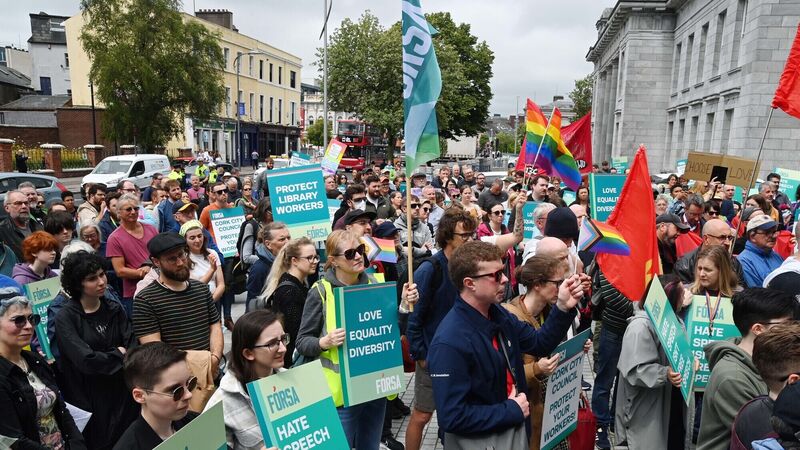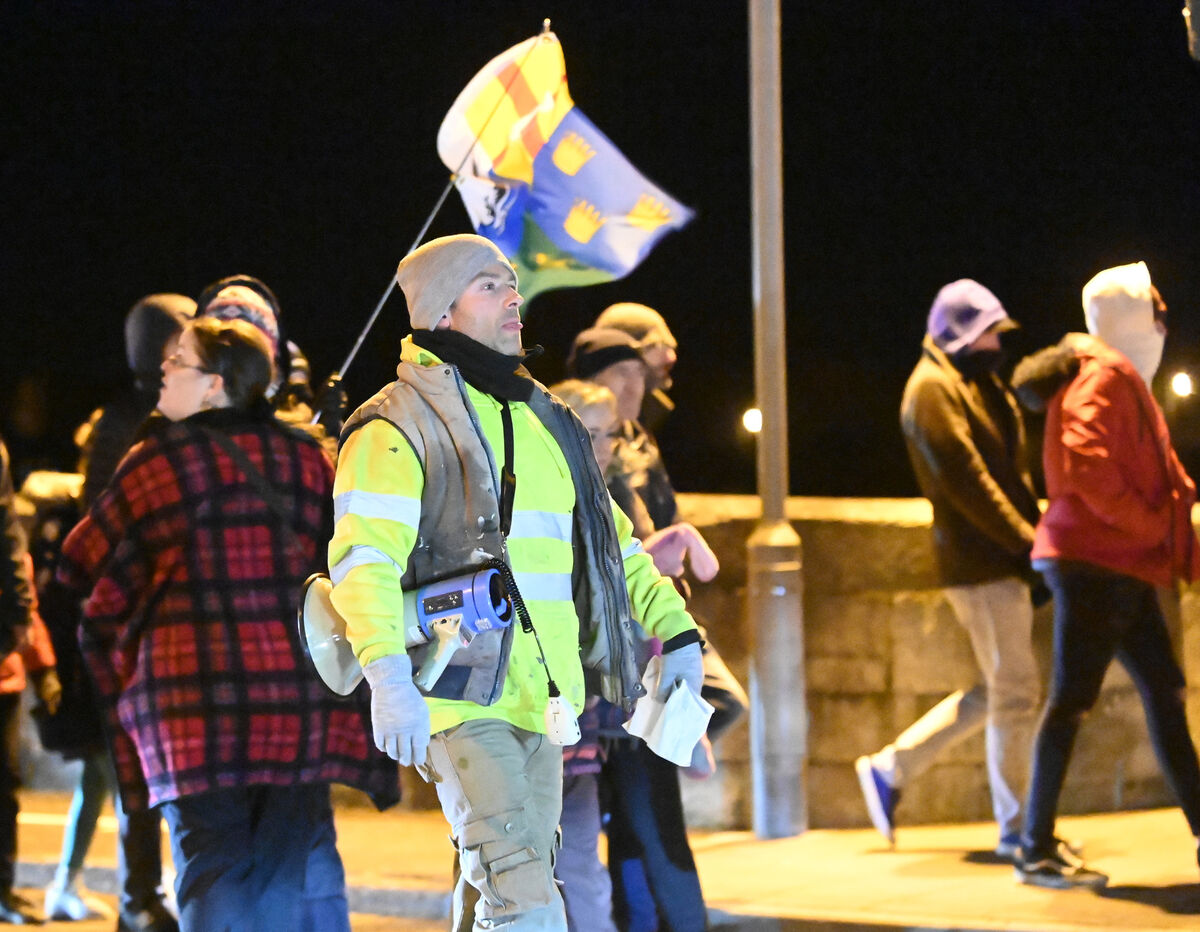Sarah Harte: Mainstream far-right ideologies becoming normalised in Europe

Last week, Cork City councillors urged Garda management to crack down on far-right agitators targeting Cork library staff, but there are mixed views on whether the Irish far-right poses a threat. Picture Denis Minihane.
Everywhere you look in Europe neofascism is on the rise, with taboos dating back to the Second World War being broken down.
As the Scottish writer Irvine Welsh (of Trainspotting fame) said this month, “Is it any wonder people don’t really know what their place is in the world? Capitalism is on the way out but we’re not mature enough for socialism, and instead, we’re sleepwalking towards some kind of fascistic model and pretty much everything is toxic.” So, is this statement hyperbolic?
Last week, Cork City councillors urged Garda management to crack down on far-right agitators targeting Cork library staff, but there are mixed views on whether the Irish far-right poses a threat.
In May Garda Commissioner Drew Harris said the far right wasn’t growing, but the Minister for Higher Education Simon Harris said he was “genuinely worried” about “the playbook of the far right” with an “appalled” retired Garda Inspector Tony Gallagher telling this newspaper that it was high time “to nip them in the bud”.
Yesterday, Fergus Finlay wrote in a piece about the attacks on the libraries that “fascism is here, among us.” So, which is it? No far-right party has ever returned a councillor or TD here. Also, the calibre of unelected far-right politicians could cause complacency because they come across as a divided, ragtag crew with nobody standing out as obviously intelligent or charismatic enough to sweep the people along.
There is a Life of Brian ‘People’s Front of Judea’ and ‘Judean People’s Front’ quality about them: so far.
The social media outpourings of The Irish Freedom Party and The National Party are imported directly from abroad and include strong anti-immigration feelings, anti-LGBTQ animus, ‘pro-family’, and anti-abortion sentiments with a rump of anti-vaxxers.
The Irish Freedom party last week floated the idea that recent French riots consequent on the murder of a young man by a policeman are to be blamed on “uncontrolled immigration in France.” The National Party has recently spoken to people in Clones about “how it feels to live in a town where the Irish population has become a minority” (tapping into nativist fears of outsiders) posing the question “If we allow ourselves to be driven to minority status in our own country, can we still call this nation Ireland”?
A third party, Ireland First, a relative newbie on the hard-right scene connected to Derek Blighe, who became a prominent anti-immigration campaigner during recent protests outside asylum centres, seems to be relatively quiet apart from the odd flare-up.
But what is happening in Europe should alarm us because far-right ideologies are being mainstreamed. What stands out most is the normalization of ideas previously considered anti-migrant, fascist, or deeply problematic with centrist parties tacking to the right.
Take just a snapshot of the last month’s headlines.
Last week, it was reported that the co-leader of the Polish Confederation party is on track to hold the balance of power in Poland’s elections. Slawomir Mentzen is on record as saying his supporters stood against “Jews, homosexuals, abortion, taxation, and the European Union.” He insists his comments were a joke which is a standard defence of far-right politicians who get hauled up.

It was also reported that Spaniards are worried that the far-right Vox party is set to enter government in the upcoming elections on 23 July. If they pull it off, they will be the first elected right-wing party since Franco left the stage, and could end up dominating Spain’s next government. Vox has explicitly launched attacks on gay and feminist movements and in Valencia forced a change to domestic violence law, downgrading it to an ‘intrafamilial’ issue.
And in the same week, the Finnish coalition was again mired in controversy when blog posts from 2008 by the current Finnish Minister for Finance and leader of the National, anti-immigration Party Riikka Purra resurfaced. If you are muttering that plenty of us couldn’t stand over old social media posts, consider the following.
One blog post translation as reported in Euronews was “Is anyone up for spitting on beggars and beating n****r children today in Helsinki”. A second was “If I were given a gun, there would be dead bodies even on the commuter train.”
The Finnish government, considered the most right-wing in Finnish history, was forced to issue a statement affirming its commitment to human rights, with Purra while admitting to ‘mistakes’ saying she won’t be resigning.
A fortnight ago, another government minister in the Finnish coalition, Vilhelm Junnila, of the far-right Finns party resigned when it emerged that during a parliamentary question in 2019, he suggested giving ‘climate abortions’ to African women were the solution to the climate crisis. He has also made jokes about ‘Heil Hitler’.
Recently, in late June, German Jews were reeling when the first far-right candidate since the Nazi era was elected at the local level for the Alternative for Deutschland party (AfD). It has been described in Germany as a watershed moment and support for the AfD is thought to run at about 20%.
In June, three far-right parties were elected to the Greek parliament including a newish party called the Spartans, who are backed by the jailed leader of a neo-Nazi party called Golden Dawn with the political narrative shifting to the right in Greece.
Also last month, the far-right Swedish Democrats launched a trenchant attack on the LGTBQ+ community probably because their traditional anti-migrant rhetoric has been mainstreamed in Sweden, so they have tacked harder to the right. At the end of last year, the Swedish Democrats stunned some observers by becoming the second-largest party in Sweden, propping up the current coalition government.
And on the media front, in June French journalists at leading newspaper walked out when Geoffroy Lejeune — an editor with a far-right reputation — was appointed ahead of a takeover of the paper by the conservative French billionaire Vincent Bollore. They feared that the paper will be turned into a platform for the far right.
Also, many Hungarian authors left the country’s largest publishing house when it was taken over by a private foundation with close ties to Viktor Orban, with fears of a further crackdown on media freedoms.
In 1920s Germany, Hitler was initially derided and having attempted to seize power in a failed coup d'état, was jailed. Xenophobic nationalism happened incrementally before a tipping point was reached thereafter, leaving astute political commentators blindsided.
by Hans Fallada, (based on a true story) documents the insidious process of ordinary people incrementally giving themselves over to dark, fascistic thinking. A working-class couple in 1946 Berlin resist the Nazi regime in heroic yet everyday ways, paying the ultimate price.
This outstanding book demonstrates how the far-right leverage tough economic conditions and how we always have a moral choice.
The current rise of the far-right in Europe can’t be attributed to one cause. An influx of migrants and refugees to Europe has been a big driver. Also, the economic crisis of 2008, and the years of misguided austerity that followed.
Dissatisfaction with neo-liberal globalization, and the increased job insecurity and falling living standards that have accompanied it has contributed. A backlash to cosmopolitan ‘wokeness’ could be in the mix with fear around the erosion of ‘traditional values’.
In reality, an obvious space here has been opened up for far-right actors to leverage. The discontent arising from the government’s mishandling of the housing crisis with its nexus to the influx of refugees and asylum seekers makes potentially fertile ground. And there’s no clear plan to address either housing or inclusion.
But although it seems relatively quiet on the Western Front here, with no giant billboards as in other European countries attacking migrants, and the LGBTQ+ community, social media continues to connect far-right keyboard warriors and movements.
The local and General elections in 2024 and 2025 will tell us more. In the meantime, let’s be careful we don’t sleepwalk our way into something awful.






